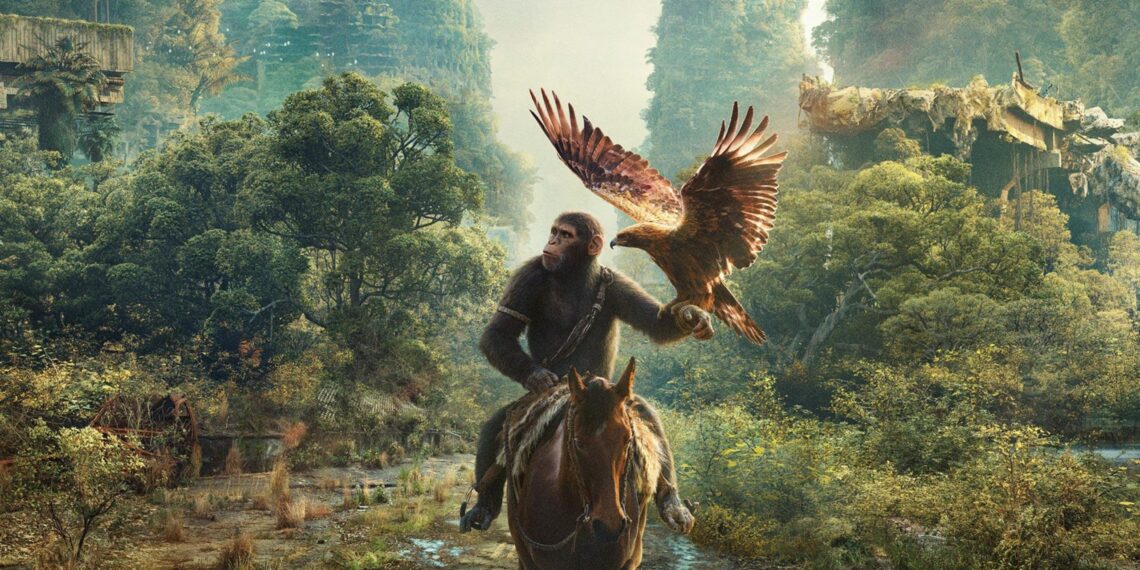The critically acclaimed ‘Planet of the Apes franchise has been shaking the box office for over 55 years, creating discussions on several heavy topics such as racial conflict and animal rights among its huge fandom.
On 2 November 2023, the official teaser for the newest sequel, “Kingdom of the Planet of the Apes,” was released, and it takes up the plot many generations after the ending of the 2017 film “War for the Planet of the Apes.”
20th Century Fox released the first film of the franchise, Franklin J. Schaffner’s “Planet of the Apes” all the way back in 1968, and it was an instant hit in the theatres. Since then, the series saw a reboot in 2011 with “Rise of the Planet of the Apes”, which introduced the fan-favorite chimpanzee, Caesar.
The modern Planet of the Apes franchise has greatly moved its new generation of fans through multiple factors: Chronological storytelling, which begins with the origins of evolved apes, breathtaking visuals and CGI work, and Andy Serkis’ exceptional performance as Caesar.
Due to a devoted fan base, the franchise is a financial success, which has grossed over 2 billion dollars worldwide, along with several of the films even receiving nominations for the Academy Awards. Thus, after the acquisition of 21st Century Fox in 2019, Disney decided to continue the exceptional storyline by announcing their plans for further sequels in 2024.

‘Planet of the Apes’ is also highly celebrated for tackling issues like racial conflict, which is created by physical differences imposed on social boundaries, along with the issue of great ape personhood, which is a movement to extend personhood and some legal protections to the non-human members of the great ape family.
With the new protagonist, Noa, and wars brewing between chimpanzee clans, the storyline tackles new issues that arise with the greater intelligence of a race. The plot appears to have also come a full circle as the apes are now the dominant species while the humans grow more primitive, reaching closer to the storyline created in the 1968 adaptation.
The Planet of the Apes Franchise
The 1968 film adaptation that initiated the film franchise is based on French author Pierre Boulle’s 1963 novel La Planète des singes, translated as “The Planet of the Apes.”
An immediate commercial hit, Arthur P. Jacobs produced four more films through APJAC Productions for distributor 20th Century Fox from 1970 to 1973: “Battle for the Planet of the Apes.” “Escape from the Planet of the Apes,” “Beneath the Planet of the Apes,” and “Conquest of the Planet of the Apes”
Along with a 1974 live-action television series and an animated series in 1975, things for the franchise went pretty silent during the end of the 20th century, finally broken by Tim Burton’s 2001 film “Planet of the Apes.”

The modern version of the franchise began in 2011 with the reboot film “Rise of the Planet of the Apes.” This was the first time the origins of the evolved apes were explored through scientific experiments with the intelligence-boosting drug ALZ-112 on the protagonist Caesar’s mother.
Two more sequels follow Caesar and his ape comrades fighting for their rights and freedom from the dominance of humanity on their more primitive counterparts: “War for the Planet of the Apes and Dawn of the Planet of the Apes” in 2014 ” in 2017.
Kingdom of the Planet of the Apes
The official description of the new film reads: “Many years after the reign of Caesar, a young ape goes on a journey that will lead him to question everything he’s been taught about the past and make choices that will define a future for apes and humans alike.”
Kingdom of the Planet of the Apes is set to release on 24 May 2024, and with the official teaser already crossing 6 million views, it is very likely that Disney will continue to release even more sequels to the franchise, now with the new protagonist Noa at the center.





